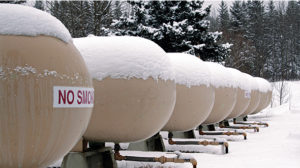Report: Propane industry fuels economic activity in Canada
A Conference Board of Canada report finds Canadian propane production is expected to increase by more than 20 percent over the next seven years.

The 20 percent propane production increase in Canada will have a positive effect on the country’s economy, a new report finds. Photo: iStock.com/BrendanHunter
The Conference Board of Canada is an independent, not-for-profit applied research organization with specialists in economic trends. The report on propane’s expected production was prepared with financial support from the Canadian Propane Association (CPA).
The report estimates the propane industry accounted for $3.5 billion in Canadian economic activity in 2016. Between 2017-25, this figure is expected to increase to an average of $4.4 billion per year. The industry’s activities are also estimated to support close to 21,000 jobs annually across Canada, and generate roughly $1 billion per year in government revenues.
Canada’s propane industry will support close to $4.4 billion in value-added gross domestic product with supplies set to increase by more than 20 percent between 2017-25, the report explains. Additionally, fuel-switching opportunities have the potential to boost domestic propane demand and sales.
“They are very much in line with what we’ve been seeing in the marketplace,” says Nathalie St-Pierre, president and CEO of the CPA. “Low-emission, accessible and affordable propane will continue to be an important contributor to Canada’s economy.”
Canadian propane production is expected to increase from just over 220 thousand barrels per day (bpd) in 2016 to more than 270 bpd by 2025. The increase will mainly be driven by steady gas production levels, increasing natural gas liquids availability and ongoing investments in midstream infrastructure, the Conference Board of Canada reports.
Wide availability of propane, competitive prices and government incentives should provide a boost to propane use in Alberta’s petrochemical sector, the report explains. Demand for propane in Canada could increase by more than 50 percent by 2025. The report adds Canada’s increasing energy demand, innovations in technology and environmental issues related to air quality suggest propane can offer fuel-switching options in market sectors like automotive fleets and power generation.
“For our industry, the report shows that propane has a vital role to play as governments develop policies that will result in an affordable, low-carbon future,” St-Pierre says.
Despite a mostly favorable outlook for the Canadian propane market, the industry still faces competition from other fuels in some sectors and in finding markets for its exports.
“Historically, the U.S. has been the primary market for Canadian propane exports, but U.S. domestic competition and increasing transportation costs for Canadian product will continue to challenge Canadian propane in U.S. markets over the coming years,” says Carlos A. Murillo, senior research associate for The Conference Board of Canada. “The Canadian propane industry will need to continue diversifying its exports towards overseas markets. A story that increasingly resonates with all our energy commodities, but one where propane is clearly taking the lead.”
















